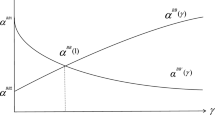Abstract
To solve large-scale linear least-squares problems, we propose a multi-step greedy randomized coordinate descent method based on the greedy randomized coordinate descent method. We also prove that the new method converges to the unique solution of the linear least-squares problem when the coefficient matrix is of full rank, and the number of rows is not less than the number of columns. Finally, some numerical experiments demonstrate the effectiveness of the multi-step greedy randomized coordinate descent method in solving linear least-squares problems.






Similar content being viewed by others
Data Availability Statement
Data sharing is not applicable to this article as no datasets were generated or analyzed during the current study.
References
Bai ZZ, Wu WT (2018) On greedy randomized Kaczmarz method for solving large sparse linear systems. SIAM J Sci Comput 40(1):592–606
Bai ZZ, Wu WT (2018) On relaxed greedy randomized Kaczmarz methods for solving large sparse linear systems. Appl Math Lett 83:21–26
Bai ZZ, Wu WT (2019) On greedy randomized coordinate descent methods for solving large linear least-squares problems. Numer Linear Algebra Appl 26(4):2237
Bjorck A (1996) Numerical Methods for Least Squares Problems. SIAM, Philadelphia
Du K, Gao H (2019) A new theoretical estimate for the convergence rate of the maximal weighted residual Kaczmarz algorithm. Numer Math Theory Methods Appl 12(2):627–639
Leventhal S, Lewis AS (2010) Randomized methods for linear constraints: convergence rates and conditioning. Math Oper Res 35(3):641–654
Lu Z, Xiao L (2015) On the complexity analysis of randomized block-coordinate descent methods. Math Program 152(1):615–642
Ma A, Needell D, Ramdas A (2015) Convergence properties of the randomized extended Gauss-Seidel and Kaczmarz methods. SIAM J Matrix Anal Appl 36(4):1590–1604
Necoara I, Nesterov Y, Glineur F (2017) Random block coordinate descent methods for linearly constrained optimization over networks. J Optim Theory Appl 173(1):227–254
Nesterov Y (2012) Efficiency of coordinate descent methods on huge-scale optimization problems. SIAM J Optim 22(2):341–362
Nesterov Y, Stich SU (2017) Efficiency of the accelerated coordinate descent method on structured optimization problems. SIAM J Optim 27(1):110–123
Paige CC, Saunders MA (1982) LSQR: An algorithm for sparse linear equations and sparse least squares. ACM Trans Math Softw 8(1):43–71
Quarteroni A, Sacco R, Saleri F (2007) Numerical Mathematics. Springer, Berlin
Richtárik P, Takác M (2014) Iteration complexity of randomized block-coordinate descent methods for minimizing a composite function. Math Program 144(1):1–38
Ruhe A (1983) Numerical aspects of Gram-Schmidt orthogonalization of vectors. Linear Algebra Appl 53:591–601
Strohmer T, Vershynin R (2009) A randomized Kaczmarz algorithm with exponential convergence. J Fourier Anal Appl 15(2):262–278
Zhang JH, Guo JH (2020) On relaxed greedy randomized coordinate descent methods for solving large linear least-squares problems. Appl Numer Math 157:372–384
Acknowledgements
We are very grateful to anonymous reviewers for their valuable comments and suggestions, which have important guiding significance to our research.
This work is partly supported by National Natural Science Foundation of China (No. 12071149), Science and Technology Commission of Shanghai Municipality (No. 20511100200, No. 22DZ2229014, 21JC1402500).
Author information
Authors and Affiliations
Corresponding author
Ethics declarations
Conflict of Interests
The authors declare that they have no conflict of interest.
Additional information
Communicated by Gabriel Haeser.
Publisher's Note
Springer Nature remains neutral with regard to jurisdictional claims in published maps and institutional affiliations.
Rights and permissions
Springer Nature or its licensor (e.g. a society or other partner) holds exclusive rights to this article under a publishing agreement with the author(s) or other rightsholder(s); author self-archiving of the accepted manuscript version of this article is solely governed by the terms of such publishing agreement and applicable law.
About this article
Cite this article
Tan, LZ., Guo, XP. On multi-step greedy randomized coordinate descent method for solving large linear least-squares problems. Comp. Appl. Math. 42, 37 (2023). https://doi.org/10.1007/s40314-022-02163-z
Received:
Revised:
Accepted:
Published:
DOI: https://doi.org/10.1007/s40314-022-02163-z
Keywords
- Linear least-squares problems
- Greedy randomized coordinate descent
- Multi-step greedy randomized coordinate descent
- Convergence property




